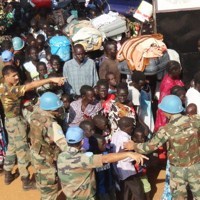When diplomats gathered at the United Nations last week to launch a series of commemorations of the 1994 Rwandan genocide, there was much talk of the need for decisive responses to early signs of future mass atrocities. By contrast, actual diplomacy to manage today’s well-advanced crises in Syria, South Sudan and the Central African Republic (CAR) was more tentative. The U.S. and Russia called for local cease-fires to ease the suffering in Syria. South Sudanese negotiatorsin Addis Ababa mulled a truce while fighting continued unabated at home. An agreement to appoint a new interim president in the CAR failed to curtail the country’s endemic violence.
Hardy optimists argue that the international community is still better at dealing with atrocities than it was two decades ago. Romeo Dallaire, the U.N. commander in Rwanda during the genocide, has praised the Security Council’s rapid authorization of additional peacekeepers to stem the fighting in South Sudan. Although the council remains divided over the Syrian war, even Russia and China pay lip service to the need to address the humanitarian consequences of the conflict. The chaos in CAR, which has unnerving echoes of Rwanda, has shaken previously uninterested powers, including the U.S., into trying to avert a genocide.
Yet in each case, the ostensible consensus in favor of international engagement has delivered underwhelming results. As I noted in last week’s column, leaders from Syria’s Bashar al-Assad to South Sudan’s Salva Kiir have ignored calls for restraint in pursuit of military gains. It is not surprising that politicians who can mobilize significant forces are prepared to use them. But there is a further problem. Western governments and international organizations have developed numerous tools to deter such violence since the Cold War. They are increasingly frustrated by the failure of these tools to work.

